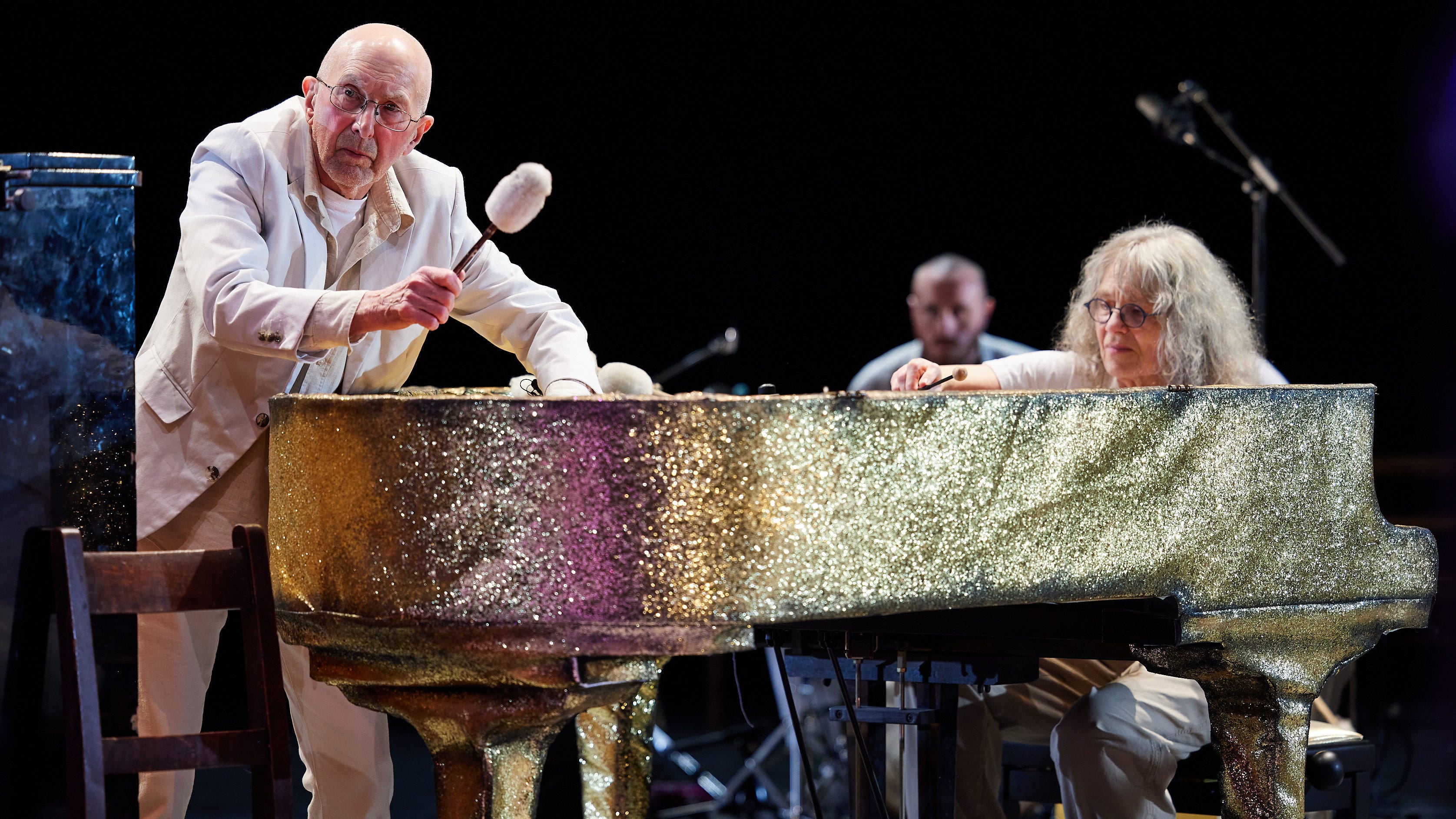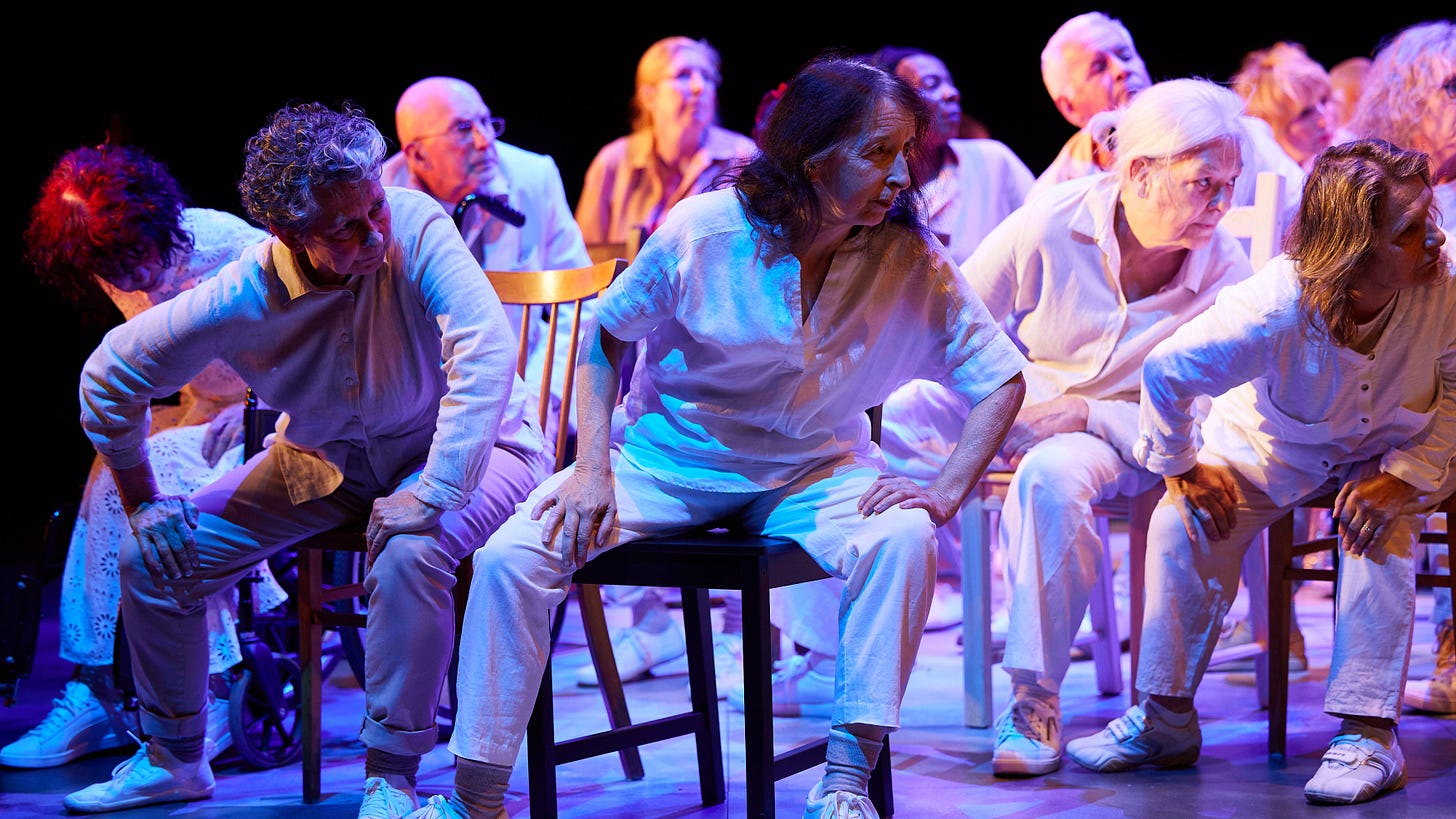Dancing In The Shadow of Death: Performance Ensemble Review
The Reason Directors Need Playwrights Is Because Writing Well Is Hard To Do
A good regional theatre is like a mother duck sheltering many little creative ducklings beneath her wings.
This outreach work, involving youth and community productions as well as activities as varied as poetry groups, art classes and folk evenings in the bar, is a substantial part of the life of any theatrical venue with aspirations to possessing a soul. But it receives limited critical attention, even though it may be benefiting from substantial professional input, and the company will almost certainly be spending public funds.
At 72 years old Alan Lyddiard, artistic director of The Performance Ensemble, has a track record which includes developing Newcastle’s innovative Northern Stage as a European-style ensemble company in the 1990s. He has worked with some big names. He knows how to direct.
His project draws on the resources of the region’s professional, amateur and community theatre-makers to stage work by older performers. The starting age is 60 and there isn’t an upper age limit — you’re welcome in off the street, with or without previous experience, until the moment you depart this vale of tears. The company is, owing to the energy and enterprise of Mr Lyddiard, comparatively well-funded, and has achieved Arts Council England National Portfolio Organisation (NPO) status for the years 2023-26.
This relatively generous degree of funding is emblematic of shifting Arts Council priorities as the Government forces arts funding out of London and into the regions as part of its national Levelling Up programme designed to even out economic disparities throughout the UK. Cynics might argue that a pocketful of small change lobbed at the North’s performance arts isn’t exactly a game-changer, but heyho. Let us be grateful for what we have.
So, to the Leeds Playhouse I went. It was a poignant visit — during the late 1990s and Noughties I haunted the building in my role as first a Trustee, then Chair, and then part-time paid administrator, of a small writing for performance charity that the Playhouse — at that time still called the West Yorkshire Playhouse — had initially gathered to its feathery bosom. Then theatre managers found us hard to shake off when they realised how troublesome we were going to be. Disorderly at times though our tiny outfit was, our mere existance operated as a permanent rebuke to the official literary manager, especially as the vigour of our script-in-hand productions made the carefully curated social worthiness of the official new writing programmes and their resulting product look polished but dull. So we lived in the shadows, more or less unacknowledged by senior management, for almost two decades before they finally found an excuse to chuck us out — or at least to start charging us the going room rate.
The role of Chair was thrilling at first. I had high hopes of recreating in the North the kind of vibrant, alternative and super-intelligent creative gang I’d experienced at university, where certain people thought nothing of spending a few days writing a play and then staging it as an uproarious student party in someone’s Jericho front room or on punts on the River Cherwell. But lightning rarely strikes twice, and eventually I tired of the constant ducking and diving that running a small charity on project funding alone entails. It was time to move on, and I didn’t look back.
The previous Playhouse’s interior was a striking piece of modern architecture which always gladdened my heart. But it was also a giant spaceship which had landed on top of, and squished, the Quarry Bank area of Leeds. It was loud, proud and international in outlook, commissioning writers such as Nobel Laureate Wole Solinka. (The first artistic director, Jude Kelly, went on to run London’s gigantic South Bank Centre.) But it was notably lacking in the more intimate performance spaces and social hangouts that are vital to nurturing a large venue’s relationship with its surrounding community.
So it was good news for the city’s creative biosphere when in October last year the Playhouse reopened after a £16m refit which included a new studio theatre. The frontage was reorientated (I seem to remember that in the Noughties the dark walk from the nearest car park to the main door was across actual rubble) and new layers of front-of-house added.
To someone familiar with the previous building, it was disorientating. But the Courtyard itself, the Playhouse’s second largest theatre auditorium, hadn’t changed much.
When the curtain rose (the stage was hidden behind a striking piece of thin red cloth), a large cast of seniors was revealed. They were sitting in rows on stackable chairs and they began to sway in unison, like seaweed.
It was an inauspicious beginning. They looked beautiful, in harmonising shirts and trousers of various pale hue, but it was all a bit static.
The theme of the show was The Performance Ensemble itself, and what belonging to the decade-old company meant to individual members of the Boomer generation. I get it. I’m absolutely 100% in favour of it, and long may it continue, but Oh dear! The words.
I’d expected to sup deeply from the cup of lives well lived. But too often when the elderly performers approached the microphone I was disappointed. They launched angry, tedious political dad-rants or recounted overly precise and clinical details of their ailments — I might have been sitting behind them on the bus. It was the performers themselves who provided the script. Heartfelt, perhaps, but desperately banal.
When a company celebrates its own existence one senses creative senility. I began to wonder if I’d died — possibly as a result of eating the Playhouse restaurant’s chicken, potato and spinach curry — and was now trapped for all eternity in the creative writing group meeting from hell.
Despite the numerous trigger warnings that preceded the anodyne Playhouse performance, nobody had warned me about this. I began to have flashbacks.
Aaargh! I covered my eyes. It was all too real. It sounded like the worst writers circle I have ever attended. (Selby, Wednesday mornings, Flaxley Road Community Centre.) Approached from the point of view of the dramatic text — or lack of it — the writing performance charity I ran at the Playhouse was much, much better than this.
To be fair, dramatists have a longstanding beef with those dance-based performers who sometimes deem it appropriate to insert, as though for decoration, some words and phrases into their physical routine.
Because the narrative effect was banal:
I arranged to meet the lady who became my second wife at a bus stop. Yes. Well. Now what? You lived happily ever after. Good for you. This is an artistic performance, not a victim impact statement.
A bit of weird randomness might have been refreshing. Perhaps, rather than attempting to eke dramatic blood out of elderly and resistant stone, Lyddiard should just have got his actors to shout out their favourite nonsense words.
Or even to go the full Father Jack. Arse! Feck!
Because time and again, the language the Leeds performers used to share these moments of high emotion, these great turning points in their lives for better or ill, failed to soar. Devoid of poetry, they just said it. They said it flatly and without affect as if they were bystanders at the scene of their own lives. Every single one of those Sinfonia performers had a Homerian epic inside them; we all do. But just because someone has a story to tell, doesn’t mean they’re any good at telling it.
I was promised “original stories by older people” but where were they? My mum claims that she once had her chocolate bar stolen by a future Prime Minister. (The late James Callaghan if you’re interested.) My uncle travelled 1,000 miles up the River Amazon in a tramp steamer. My neighbour, a submariner, slept on top of a nuclear bomb.
And the last time I was with my brother he kept me in stitches talking about that Ancient Greek philosopher who was killed when an eagle dropped a tortoise on his head. What meaning, he wondered with mock seriousness, could we extract from this event? Especially as dropping tortoises from a height to crack open their shell is something that eagles of the region actually do.
Okay, stories of birth, death and marriage don’t have to be out of the ordinary but they do have to mean something because cracking open the meaning of things is what human beings actually do.
The show got better as it progressed. There were carefully ambitious dance moves from a group of people who must have been, as elders, in serious danger of bone fractures. There were two beautiful song interludes — one allegedly a favourite of Italian partisans, the other a calypso.
But I still felt short-changed. The precise and disciplined movement routines — which at times amounted to something lovely — were let down by the meagreness of the spoken texts, which ranged from broken-hearted — I found him dead on the kitchen floor, he was only 50 — to smugly self-congratulatory — I got the job!
Dancers may not be able to write, just as writers may not be able to dance.
Plus, it was all so disjointed. I found it difficult to relate the music to the text, particularly in the case of the two set-piece songs.
As the show wore on, composer Nikola Kodjabashia’s specially written accompaniment became increasingly cacophonous and I wondered if, like me he was thinking of Shakespeare’s withering lines from Macbeth:
“Life's but a walking shadow, a poor player that struts and frets his hour upon the stage and then is heard no more.
It is a tale told by an idiot, full of sound and fury
Signifying nothing.”
But Macbeth was wrong and died for his cynicism. Perhaps I am just privileged to come from a family of natural storytellers.
“Like so many Americans, she was trying to construct a life that made sense from things she found in gift shops,” wrote Kurt Vonnegut in his novel Slaughterhouse Five. Perhaps, too, I am privileged to come from a family of natural philosophers. My mad Catholic aunts, deep in mutual conspiracy to deny Third World women their reproductive rights, were veritable human factories of meaning. Any one of them could have told a better story than this, though their knees might not have been up to the dancing.
Which leads me to another observation — how godless it all was. Perhaps many British boomers, raised on school milk and free dentistry, didn’t feel the need for religion. But this is the mid-21st century and one senses that it’s going to take the heft of a big, ole, dirty world religion — Buddhism, Islam or Christianity — to vanquish the Morder-like forces of corporate-inspired technological onslaught. The Vatican is already tooling up.
Perhaps my Catholic aunts, full of stories, weren’t so crazy after all.
In the end, actors and writers are not created equal; some hold our attention, others do not. Personally, I would have shaped and pruned like a gardener; cut out the worst, developed the best. But that would have been inimitable to the democratic spirit of the ensemble.
Have I been too harsh? Sinfonia travels to CAST, Doncaster, May 31, Jun 1 (£15) with other dates to be announced.





